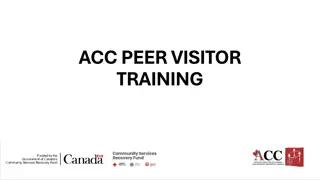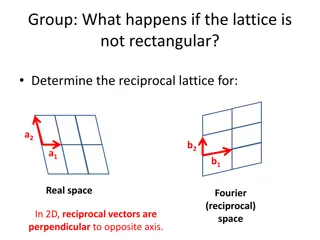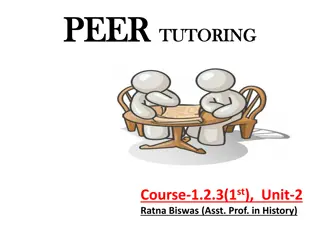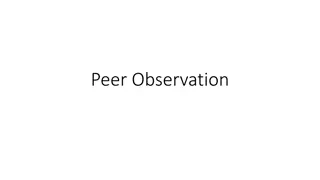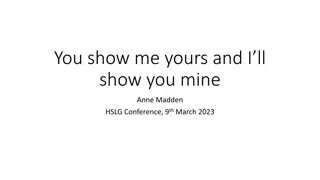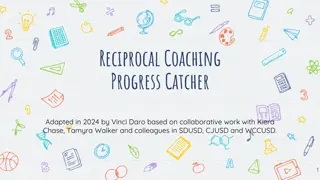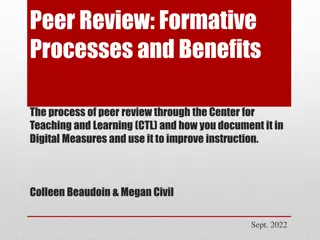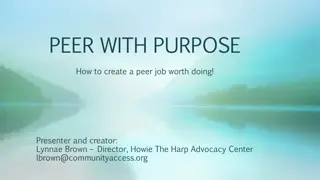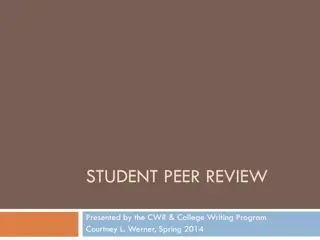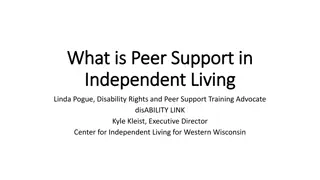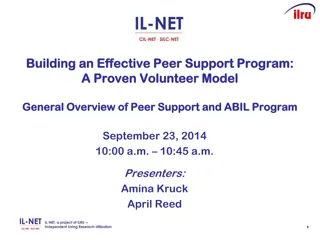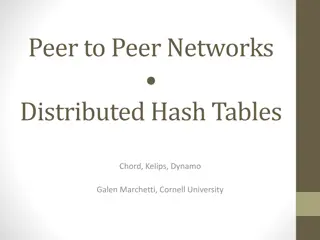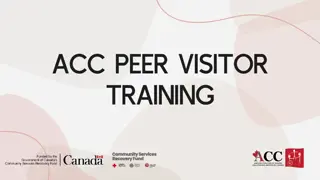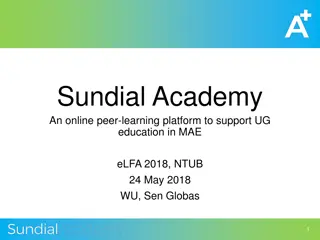Enhancing Learning Through Reciprocal Peer Teaching in Higher Education
This presentation discusses the concept of reciprocal peer teaching in higher education, focusing on how students can take on teaching roles to enhance their learning experience. The speakers emphasize the benefits and strategies of peer teaching, providing a framework for implementing this approach in various subjects. Theoretical advantages, practical examples, and the role of trainee teachers in facilitating peer teaching workshops are explored.
Download Presentation

Please find below an Image/Link to download the presentation.
The content on the website is provided AS IS for your information and personal use only. It may not be sold, licensed, or shared on other websites without obtaining consent from the author. Download presentation by click this link. If you encounter any issues during the download, it is possible that the publisher has removed the file from their server.
E N D
Presentation Transcript
1 EXPECT TO ACHIEVE Reciprocal peer teaching Judith Kneen Senior Lecturer Secondary English Elaine Pattison Senior Lecturer MFL
2 EXPECT TO ACHIEVE Task In pairs, label yourselves A and B. A to teach knowledge/understanding/ skill to B (2 minutes) B can seek clarification and ask questions. E.g. using Twitter; rules of a game; applying make-up; a theory; words from a foreign language; the offside rule; global warming; interest rates; how to eat spaghetti... B will teach new understanding/skill to group.
3 EXPECT TO ACHIEVE Qui docet discet He who teaches, learns Our rationale Teaching supports learning; teaching the skill of teaching, supports students learning about teaching. Trainee teachers within HEI institutions are a rich resource Aims of today To share our experience To provide a possible framework for peer teaching
4 EXPECT TO ACHIEVE Background Buddies MFL KS2/3 PGCE (10) English secondary PGCE (20) Drama skills focus Workshop approach Developing process
5 EXPECT TO ACHIEVE The workshops English trainees taught by tutor. They prepare w shop for MFL. Tues English PGCEs deliver workshop for MFL students. They prepare w shop for English, though focusing on MFL skills. Wed MFL trainees deliver w shop. Evaluation. Fri
6 EXPECT TO ACHIEVE Terminology students learning from and with each other in both formal and informal ways (Boud et al 2001 p4) Peer learning co-operative learning pairs of students with an asymmetrical relation and a common known and shared objective (Duran and Monereo (2005 p181) peer teaching or peer tutoring is a far more instrumental strategy where students take on a limited instructional role (Boud et al 2001 p4) Peer tutoring Peer teaching Reciprocal Peer Teaching students alternate roles as teacher and students (Krych et al 2005 noting term first used by Allan And Boraks)
7 EXPECT TO ACHIEVE Theoretical advantages/disadvantages Topping 1996 Supported exploration through social and cognitive interaction with a more experienced peer (social constructivist view) Preparing to teach enhances cognitive process (Hartman 1990) Annis study (1983) a) read b) read to teach c) read to teach and teach Other advantages include: interactivity, participation, swift feedback, student ownership, etc. Consumes organisational time the requirements for training students in teaching and learning skills are greater Quality of tutoring may vary
8 EXPECT TO ACHIEVE Considerations and questions To what extent do student teachers regard RPT as beneficial to building classroom skills and confidence? Widely used strategy Requires careful organisation What can ITE gain from it?
9 EXPECT TO ACHIEVE Methodology Drama techniques confidence scale questionnaire Pre-workshops Post-workshops Questionnaire about RPT Post-workshops Group discussion on RPT Post -workshops Queries whilst on school experience
10 EXPECT TO ACHIEVE Findings Confidence scales Trainees had to use scales to indicate confidence in 15 areas, including: Using particular techniques, such as mime, improvisation, props Planning and managing active learning Making drama techniques relevant to their teaching 1st survey just before initial session 2nd survey after they had taught other group
11 EXPECT TO ACHIEVE Findings Confidence scales 1st survey English highs: use of S&L (average 3.7) MFL high: role play (average 3.6) Biggest difference: Instructing on moving safely
12 EXPECT TO ACHIEVE Findings Confidence scales 2nd survey English highs: warm ups and using props (average 4.8) MFL high: making drama relevant (average 5) Biggest difference: making drama relevant
13 EXPECT TO ACHIEVE Findings Confidence scales English average moved from 3.7 to 4.8 MFL average moved from 3.6 to 5 Greatest gains: English 1) mime & movement 2) props MFL 1) making drama relevant 2) props
14 EXPECT TO ACHIEVE Findings RPT questionnaires Questionnaire Likert scale questions and open questions targeted on peer teaching Completed after all of the workshops Returns MFL = 10, English = 11
15 EXPECT TO ACHIEVE Findings RPT questionnaires likert scale responses Overall positive impact Felt strongly positive experience improved confidence
16 EXPECT TO ACHIEVE Findings RPT questionnaires open questions Identification of key themes Collaboration Emotional impact positive and negative Adaptation Application
17 EXPECT TO ACHIEVE Group Interview- Findings Themes mirrored : Unpicking the collaborative process Acknowledging emotions Recognising pedagogical applications PLUS Articulating the intellectual process
18 EXPECT TO ACHIEVE Outcomes: impact on school practice I was pleasantly surprised with their performance and their behaviour throughout the lesson . MFL It was fairly successful as it got all the kids involved . E The children visibly enjoyed it and it was nice to see them working together out of their seats, creating something MFL Their responses became more sophisticated and deep. They are a middle set class, who are quite shy and this really helped to bring them out of their shells . E
19 EXPECT TO ACHIEVE Key Findings Overall messages Raised confidence levels Emotionally engaged Different perspectives Moving beyond independent learning to interdependent learning Boud Social benefits
20 EXPECT TO ACHIEVE References and further reading Boud, Cohen and Sampson (2001), Peer Learning in Higher Education. London: Kogan Page. Clift, R.T. and Wilson, S. (1984) 'Training Preservice Teachers to Use Dramatic Activities with Secondary School Students' Annual Meeting of the American Educational Research Association, New Orleans, LA, 23rd to 27th April. Duran and Monereo (2005) 'Styles and sequences of cooperative interaction in fixed and reciprocal peer tutoring', Learning and Instruction 15:3 pp. 179-199. Fantuzzo, J.W., Dimeff, L.A., Fox,S.L (1989) Reciprocal Peer tutoring: A multimodal Assessment of Effectiveness with College Students , Teaching of Psychology, 16(3),pp.133- 135 Harris, V. and Grenfell, M(2004) Language learning strategies: A case for cross curricular collaboration. Language Awareness,13(2) pp.116-130 Krych, A.J., March, C.N., Bryan, R. E., Peake, B. J., Pawlina, W. and Carmichael, S.W. (2005) 'Reciprocal Peer Teaching: Students Teaching Students in the Gross Anatomy Laboratory', Clinical Anatomy 18 pp.296-301 Longaretti, L., Godinho, S., Parr, G. and Wilson, J. (2002) 'Rethinking Peer Teaching' Conference of the Australian Association for Research in Education Brisbane Rittschof, K.A. and Griffin, B.W. (2001) Reciprocal Peer tutoring; re-examining the value of a co- operative learning technique to college students and instructors , Educational Psychology, 21(3) pp. 313-331 Topping, K.J. (1996) 'The effectiveness of peer tutoring in further and higher education: A typology and review of the literature', Higher Education 32:3 pp. 321-345.



